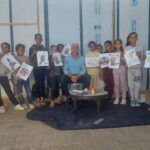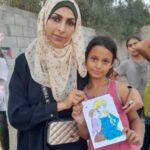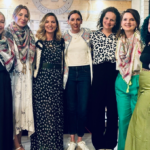Sad to leave this suffering and blessed place
Whenever I am asked by a man who is expecting his first child what it’s like to be a father, my reply is standard. It is much tougher than you expect, and it is much more wonderful than you expect. Until you’ve had your first child, you know that your life will be disrupted, and that you will lose control over much of it – but you have no idea quite how much. Likewise, you know and expect to love your child, but until he or she is there, you cannot conceive of how deep that love goes.
And so it is with Gaza. Before going in, I had read a huge amount, talked to people in and out of Gaza, worked to get some projects in, seen the pictures and TV images. But going in to see her and meeting her people shows you both how grossly you had underestimated or not conceived of the daily difficulties, and also how incredibly community minded and generous her inhabitants are despite these difficulties in a way that is difficult to imagine.
Almost every gathering in the evening would include the questions “did you hear any of the bombs last night? Where did they land? Who was killed? Or was this another bombing just to terrorise and make the children and everyone afraid?” Aside from the deaths, and there were about a dozen while I was there including some children, there is also a strategy whereby Israeli bombers will target an empty space or an unoccupied building. Not to kill, but to continue fear and trauma and to try to create a feeling of impotence and subjugation amongst Gaza’s people. There is an Arabic word, ‘sumoud’ which roughly translated means standing firm against aggression. It is a much used word here. Too much used. While sumoud is a characteristic to be proud of in difficult times, it is predicated on being in those difficult times, and sad that children need to grow up in an environment where sumoud is so badly needed.
The issue is not just about the Israeli bombing. When Hamas or another group retaliates to Israeli fire on Gaza, you hear the distinct and loud whoosh of their rockets being fired. And the lack of technology, which is but one facet of quite how one-sided this “war” is, means that on occasion a rocket will land inside Gaza before making it out of the border. While I was here, there was one that landed quite centrally, and but for the good fortune of not having exploded, would have likely killed over a hundred.
Aside from the military tit-for-tat, you also have the blackouts. When these happen at night, you can feel the increase in tension. Somehow, even though the threat of attacks is ever present, having no light suddenly in the evening just psychologically puts you more at edge. And although conversation and everything else picks up quickly, you know that beneath the surface, the tension remains.
Then you throw in the poverty. Much noise has been made by those who would like Gaza to be ignored about the new shopping mall there, and how its presence shows the lack of poverty here. I would love those who write about this to come and pay Gaza a visit. They will see the mall, probably smaller than half or a third of a football pitch in size, and the bullet-strewn unbuildings around it. And the roads, the vast majority of which are dirt tracks or potholed. And the vast array of corrugate iron slums. And the children playing in streets with cars and bikes speeding around them as there’s little else for the kids to play in. And the piles of garbage strewn all over the town. And even the terminology – when you cross Gaza, you go from “wire to wire”, rather than North to South or East to West. I could continue this list without pause for pages.
But then on the flipside, you have the Gazans. Already naturally a generous and community minded community, living in times of need has made them into a people more formidable and beautiful than they already were. I had forgotten how the bedouin, a people who’s families today are still subjected to ethnic cleansing on the West Bank and in Israel, have generosity hewn into their being. I paid a visit to a bedouin man, in his house (brick, not tent), who had been involved in a large number of children’s community activities. I left his home without having had lunch, and in so doing nearly provoked an international incident. I had forgotten that declining his generosity was not, as we would have it in the UK, being nice or just needing to get on. No, declining generosity is pretty much an insult, a denial of his right and his responsibility to be generous. It is inculcated into centuries of bedouin culture.
Then there was the man (who I will not name for his own security) who runs a huge centre for disabled children and their families, and who has served about half a dozen prison sentences in Israeli gaols for his community work, and to top it all, then has issues with the Hamas government for similar reasons. He has worked through these, and now runs an incredibly successful institute.
Or the team that runs a very grassroots centre for the disabled in the refugee camp of Bourij. Many of Bourij’s residents are descended from families evicted from Al-Majdal, a town who’s native population was expelled by the Israeli army and now re-peopled by Israelis as Ashkelon. Between the poverty and the military onslaughts, a larger than expected part of the population here has some form of handicap. This centre, in the middle of Bourij camp, specialises in children with mental disabilities. The manager and founder runs a large factory making sweets and cakes for his day job, and runs this centre by the side. It supports several dozen families, and also runs some play-based education to support school work for fully able children, including life skills for teenagers. They are rightly proud of their centre, but for most of you reading this in the West, it would look extremely run down and in need of work.
Then there’s my host, the Palestinian Christian Issa. Volumes could be written about this man and his work alone. Aside from his leadership of the local YMCA, and ensuring that it cares for people of all religions, this Palestinian pillar of a man co-founded the Canaan Institute of New Pedagogy. Despite that mouthful of a name, this organisation provides direct services to children in the community, teaches and enables adults to work with children, and serves alsmost like a community hub that links people and organisations involved in community work across the whole Gaza strip. It is no understatement that Issa and the institute have been a force of good for nearly half a million children here in the overcrowded strip. They were instrumental in the planning and delivery of UNRWA’s summer games to a quarter of a million children every year before this one since 2007 or 2008, and in the thinking and execution of the wonderful children’s kite-flying world record on the beaches of Gaza.
Again, this list is interminable. The community spirit and generosity of the people I have met here is unrivalled anywhere else that I have been, be that in Europe, North or South America. And that is why I am feeling so sad at leaving this wretched and blessed place.






I read your blog, and really i wanna to thank you , for your courage to come to Gaza, and leave your home and your family to help your and your father people , many thing appear on the TVs in the negative way, or in such away make isreal as the victim, they stole my land , kill my people,! prevent me to travel and continue my learning outside, prevent me to go to the next side ( west bank ) to meet my friends for five years asking for a permission to cross my land
Salwa, the courageous ones are you who live there every day and do it with such spirit. I really hope that soon we can be in a place where Palestinians have back our human rights, and our children can grow up in happy and safe environments like every child should. Thank you all for your hospitality.